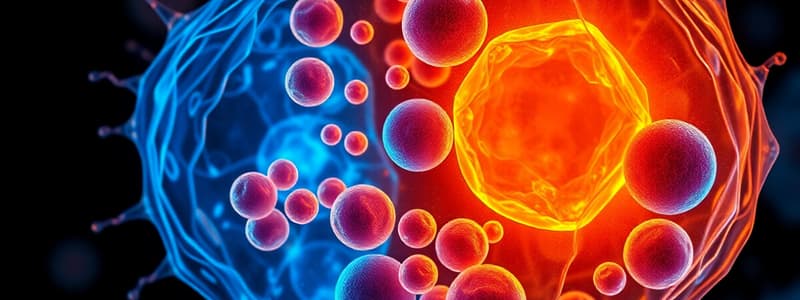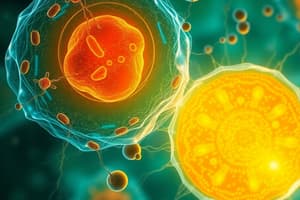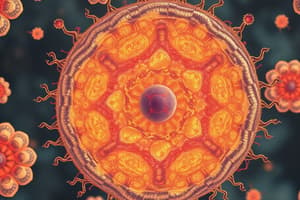Podcast
Questions and Answers
Which feature is not characteristic of prokaryotic cells?
Which feature is not characteristic of prokaryotic cells?
- Simpler structure
- Absence of membrane-bound organelles
- Presence of mitochondria (correct)
- Lack of a nucleus
What is the primary function of the Golgi apparatus in a cell?
What is the primary function of the Golgi apparatus in a cell?
- Digestion of waste materials
- Energy production
- Synthesis of DNA
- Processing and packaging of proteins and lipids (correct)
Which process is not considered a form of cellular transport?
Which process is not considered a form of cellular transport?
- Osmosis
- Diffusion
- Active transport
- Protein synthesis (correct)
What distinguishes eukaryotic cells from prokaryotic cells?
What distinguishes eukaryotic cells from prokaryotic cells?
Which type of cell contains chloroplasts?
Which type of cell contains chloroplasts?
During which process do cells produce gametes?
During which process do cells produce gametes?
What role does the cytoskeleton play in the cell?
What role does the cytoskeleton play in the cell?
What is the primary function of ribosomes within the cell?
What is the primary function of ribosomes within the cell?
Flashcards
Cells
Cells
The basic building blocks of all living organisms, exhibiting a diverse range of shapes and sizes.
Plasma Membrane
Plasma Membrane
The outermost layer of a cell, acting as a barrier and regulating the passage of substances in and out.
Nucleus
Nucleus
The central control center of a eukaryotic cell, containing the cell's genetic material (DNA).
Mitochondria
Mitochondria
Signup and view all the flashcards
Ribosomes
Ribosomes
Signup and view all the flashcards
Cellular Respiration
Cellular Respiration
Signup and view all the flashcards
Photosynthesis
Photosynthesis
Signup and view all the flashcards
Mitosis
Mitosis
Signup and view all the flashcards
Study Notes
Cell Structure
- Cells are the basic units of life, exhibiting a diverse range of shapes and sizes.
- All cells share fundamental characteristics: a plasma membrane, cytoplasm, and DNA.
- Prokaryotic cells, lacking a nucleus and other membrane-bound organelles, are simpler in structure.
- Eukaryotic cells, possessing a nucleus and organelles, are more complex.
- The plasma membrane encases the cell, regulating the passage of substances in and out.
- The nucleus houses the cell's genetic material (DNA), directing cellular activities.
- Mitochondria are the powerhouses of the cell, responsible for energy production through cellular respiration.
- Ribosomes synthesize proteins, essential for various cellular functions.
- Endoplasmic reticulum (ER) facilitates protein and lipid synthesis and transport.
- Golgi apparatus processes, packages, and modifies proteins and lipids.
- Lysosomes contain digestive enzymes that break down waste materials.
- Vacuoles store water, nutrients, and waste products.
- Cytoskeleton provides structural support and facilitates intracellular transport.
- Cell walls, present in plant and fungal cells, provide rigid support.
Cell Types
- Prokaryotic cells include bacteria and archaea.
- Eukaryotic cells include animal, plant, fungal, and protist cells.
- Plant cells are characterized by chloroplasts (for photosynthesis) and a large central vacuole.
- Animal cells exhibit specialized structures like centrioles and lysosomes.
- Specialized cells in multicellular organisms exhibit structural and functional differentiation, adapting to their specific roles.
Cell Processes
- Cellular respiration is the metabolic process by which cells convert glucose into ATP, the energy currency of the cell.
- Photosynthesis is a remarkable process in plant cells that converts light energy into chemical energy in the form of glucose from carbon dioxide and water.
- Mitosis is the process of cell division, resulting in two identical daughter cells.
- Meiosis is the process of cell division that produces gametes (sex cells).
- Active transport moves substances against their concentration gradients, requiring energy in the form of ATP.
- Passive transport allows substances to move down their concentration gradients, without energy.
- Diffusion is a type of passive transport where molecules move from an area of high concentration to an area of low concentration.
- Osmosis is the passive transport of water across a selectively permeable membrane.
Cell Communication
- Cells communicate with each other through various mechanisms, including chemical signals and direct contact.
- Cell signaling pathways allow cells to receive and respond to external stimuli.
Cell Cycle
- The cell cycle describes the series of events that cells go through as they grow and divide.
- The cell cycle includes interphase (growth/development phase) and the mitotic phase (division phase).
- Mitosis and cytokinesis ensure accurate DNA replication and division of cytoplasm, resulting in two genetically identical cells.
Studying That Suits You
Use AI to generate personalized quizzes and flashcards to suit your learning preferences.




